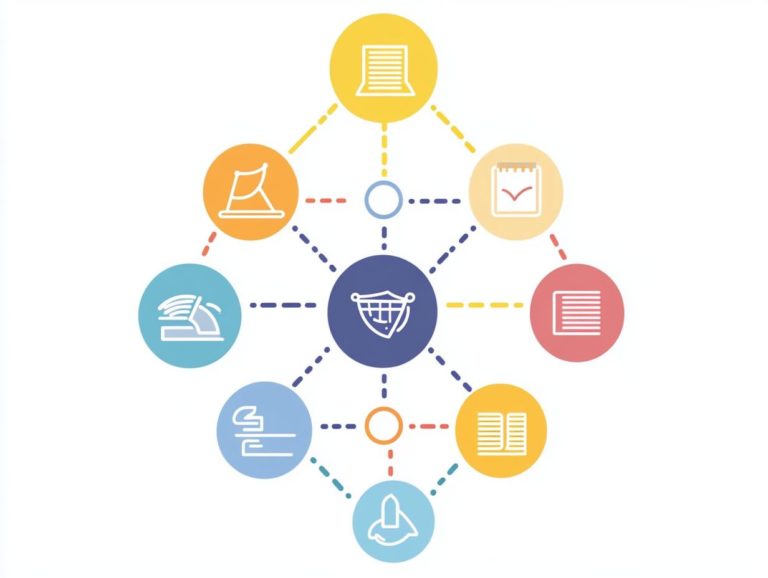Preparing for Your Home Insurance Adjuster Visit
Navigating the world of home insurance can feel overwhelming, especially when you’re faced with losses and claims. In this intricate process, a home insurance adjuster becomes your indispensable ally, tasked with assessing damages and determining compensation.
Whether you’re dealing with a recent disaster or simply seeking clarity on your policy, understanding the adjuster’s role and responsibilities is vital. This article will provide you with comprehensive insights covering everything from the reasons you might need an adjuster to how to prepare for their visit and what to expect during the assessment.
Equipped with the right knowledge, you can approach the situation with confidence, ensuring that your interests are effectively represented.
Contents
Key Takeaways:
Understand the role and responsibilities of a home insurance adjuster, who is responsible for assessing damage and determining coverage for claims. Be prepared for the adjuster visit by gathering necessary documents, such as policy information and proof of damage, to expedite the assessment process.
During and after the visit, expect to provide information and answer questions about the damage. You will also receive next steps and possible outcomes for your claim.
What is a Home Insurance Adjuster?
A home insurance adjuster plays a vital role in the world of homeowners insurance, evaluating claims related to property damage.
Think of them as the detectives of the insurance realm. They assess various forms of damage whether from storms, water, mold, or other perils to determine the compensation you’re rightfully owed under your policy.
Through careful damage assessments, an adjuster supplies the crucial documentation that supports your insurance claim process. This documentation ultimately shapes the financial decisions you’ll face when dealing with insurance companies.
Grasping the adjuster’s role gives you the power to understand your rights and responsibilities throughout the claims journey.
Why You Might Need a Home Insurance Adjuster
Homeowners may encounter situations that require the expertise of a home insurance adjuster, especially when dealing with serious property damage or complex insurance claims.
Facing storm damage that threatens structural integrity or dealing with the aftermath of water and mold damage can be daunting. Enlisting the help of an adjuster can streamline the claims process, ensuring it is managed fairly and efficiently.
They navigate the often confusing realm of insurance regulations, offering clarity and support as you address disputes with your insurance company over coverage limits and compensation calculations.
Preparing for the Adjuster Visit
Get ready for your adjuster visit! This step can shape your claims process significantly. To ensure everything goes smoothly, refer to this step-by-step guide to your home insurance claim and meticulously document any property damage while gathering relevant evidence.
Familiarize yourself with your rights as a policyholder before the adjuster arrives. This preparation involves conducting a thorough home inspection to assess the damage, collecting repair estimates, and making temporary repairs to prevent further deterioration.
The more organized and prepared you are, the clearer the picture the adjuster will have. This ultimately contributes to a fair settlement.
What to Expect During the Visit
During the adjuster visit, you can anticipate a comprehensive assessment process that carefully evaluates the extent and nature of your property damage. This is crucial for determining the insurance payout you may receive.
The adjuster will inspect the damaged areas carefully. They will ask questions about what happened and how you responded to the damage, as well as any previous insurance claims you may have filed. This interaction is essential for facilitating a fair settlement, as the adjuster’s report will play a pivotal role in the claims process.
To ensure a smoother experience, be prepared to provide additional information and clarify details of your insurance policy.
Understanding these steps can empower you to take charge of your claim!
Following Up After the Visit
After the adjuster visits, it s essential to follow up proactively. This ensures the claims process moves along smoothly.
Understand the next steps. This could involve waiting for the adjuster s report, talking to a claims manager, or preparing for possible negotiations if disputes arise.
Keep track of any documentation or evidence needed for your claim. Staying informed helps you handle insurance issues more easily.
Common Situations that Require an Adjuster
As a homeowner, you might face situations where you absolutely need an expert claims adjuster on your side! Significant storm, water, or mold damage often complicates things.
For example, after a fierce storm, your roof might sustain damage, exposing your home to leaks. Or, persistent water damage from a faulty pipe could lead to mold growth, requiring a thorough inspection.
Consider hiring an adjuster for fire damage as well. It can significantly impact your claims history and future premiums.
In all these cases, a knowledgeable adjuster clarifies coverage and helps you document damages accurately.
Steps to Take Before the Visit
Before the adjuster arrives, take steps to ensure a productive visit. Thorough inspections and detailed documentation are crucial.
- Start by inspecting your property carefully, looking for both visible and hidden damages.
- Check for water damage, structural issues, and any temporary repairs that might prevent further harm.
- Document your findings with clear photos and detailed notes. Keep everything organized for the adjuster.
- Gather repair estimates from reliable contractors to strengthen your claims evaluation.
- Compile all necessary documentation like receipts and prior repair records to present a strong case.
Documents to Have Ready
Having the right documents ready is crucial for a smooth claims process. Gather these important documents:
- Your insurance policy
- Previous claims history
- Photographs of the damage
- Receipts for repairs or replacements
- Any relevant correspondence with customer service representatives
Organizing this documentation makes your interaction with the adjuster smoother. Clear evidence of the damage can significantly influence coverage approvals and speed up settlements.
This approach ensures you receive the support you need without unnecessary delays.
Assessment Process and Questions
During the assessment, the adjuster will evaluate the property damage and ask questions to determine the extent of your claim. This dialogue is crucial for clearing up any vague details.
The adjuster will want to know about the cause of the damage, any prior repairs, and what steps you’ve taken to prevent further issues. Your answers will shape their understanding and influence the negotiation process.
How clearly you communicate the details can significantly impact the final insurance payout. The adjuster’s assessment of whether the damage was sudden or gradual will guide the decision-making process.
Next Steps and Possible Outcomes
After the adjuster visits your home, it’s important to understand the next steps in the claims process and the potential outcomes that may unfold. These can range from receiving a fair settlement to encountering insurance disputes.
Engaging effectively with your claims manager is crucial to ensure that your claims are managed appropriately. Once the adjuster’s evaluation is complete, the timeline for processing claims can vary significantly. It often ranges from several weeks to a few months, depending on the complexity of your situation.
During this time, keeping the lines of communication open is key! Regularly reaching out to your claims manager can help clarify any uncertainties and expedite the resolution process.
Documenting all interactions, repairs, and expenses meticulously is vital to bolster your claim. If disputes arise, having comprehensive records serves as necessary evidence to advocate for a favorable outcome.
Staying proactive and informed empowers you to navigate this process more effectively.
Frequently Asked Questions
What is a home insurance adjuster visit?
A home insurance adjuster visit is a meeting between you and your insurance adjuster. They assess the damage to your home and determine the coverage and compensation for your insurance claim.
Why do I need to prepare for my home insurance adjuster visit?
Preparing for your home insurance adjuster visit is crucial for a smooth and successful claims process. Knowing what to expect during a home insurance claim helps you be organized and have all necessary documents ready, allowing the adjuster to accurately assess the damage and expedite your claim.
What should I do before the adjuster arrives?
Before the adjuster arrives, document all the damage to your home by taking photos and videos. Also, gather relevant documents, such as your insurance policy and receipts for repairs or replacements. To prepare effectively, it’s helpful to know what to expect during a home insurance inspection and make a list of any questions or concerns you have for the adjuster to address during the visit.
Should I be present during the adjuster visit?
Yes! It’s highly recommended to be present during the adjuster visit. This way, you can show the adjuster the damage firsthand, point out any concerns, and ask any questions you may have. It allows for a more accurate assessment of the damage.
What should I expect during the adjuster visit?
During the adjuster visit, they will assess the damage to your home. The adjuster may take measurements and photos, and review your insurance policy to determine the coverage for the damages. After the visit, they will provide you with a written estimate and discuss next steps for the claims process.
Can I negotiate with the home insurance adjuster?
While it’s not recommended to negotiate with the adjuster on your own, you can express any concerns or disagreements with the initial estimate. If you feel the estimate is inaccurate or does not adequately cover the damages, request a re-evaluation or hire a public adjuster to negotiate on your behalf.



